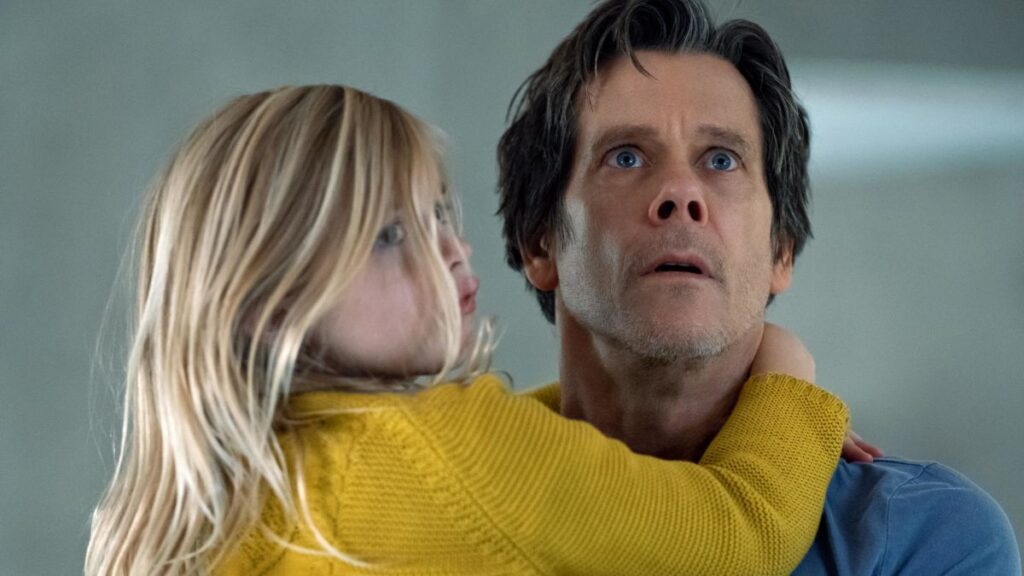Summary
A man moves to Wales with his considerably younger wife and daughter to get away from it all before his wife leaves for an acting job – but their destination is haunted, dredging up their tumultuous, emotional past.
You Should Have Left, written and directed by David Koepp and produced under Blumhouse’s microbudget banner (a favorite studio of mine, uneven and unpredictable as it may be), tells a story of grief, trauma, guilt, and trust within the ever-twisting halls of a Welsh Airbnb. Kevin Bacon takes the aged lead, with Amanda Seyfried playing his young, vivacious actress wife – I mention this twice at the top of my review because the film makes mention of Bacon’s age about 50 times throughout its 93-minute runtime. Despite some hamfisted aspects of its script, like the age thing (by the way, Kevin Bacon’s over 60 and Seyfried is 34) the film generally succeeds at what it tries to do while never reaching the lofty heights of its ancestor, The Shining.
Theo (Bacon) and Susanna (Seyfried – she’s half Kevin Bacon’s age!) take their daughter Ella (Avery Essex) to Wales while Susanna prepares for her next film role. They stay in a befogged moor-enclosed ultramodern house far outside of the nearest town, and something seems strange about the abode. Ella says that it makes her feel funny and that she has had strange dreams before arriving there – though those dreams began before they got to Wales. While we don’t know for sure that Susanna is dogged by those same haunting feelings, Theo sure is. Like Stephen King’s Torrence family, Theo and his family have arrived in a house altogether Otherworldly, with mazelike, shifting hallways, rooms that don’t behave properly, haunting dreams, writing that appears out of nowhere, and eerily oppressive feelings that drive the family apart.
Luckily, You Should Have Left doesn’t have the wholesale ambitions of Kubrick’s masterpiece, The Shining, but it succeeds in its exploration of guilt and grief’s cancerous effects. Theo has a past that he’s been trying to meditate away, and it’s led to deep-seated trust issues within his marriage. This eats away at their foundation, and no matter how far they travel, that trust and those feeling catch up to them.

The acting here is solid, with Bacon not going to his schlockiest corner, and newcomer Avery Essex doing a great job of playing upon the emotional rift exposed by Bacon and Seyfried’s marriage. Moreover, the atmosphere of the house and the use of quick cuts and strange angles really sells the strangeness of their situation. Geoff Zanelli’s unpredictable score adds to the emotional undercurrent at work in You Should Have Left, everything working in tandem.
So, why give You Should Have Left only 2.5 stars after all this praise? Its message and themes work well, after all. The details sell it short. From the first walkthrough, the house screams, “I’m going to murder everyone!” There’s no buildup of suspense here, nor any surprise to the events that unfold. Seyfried’s performance is half-baked and emotionless, with wooden line readings throughout. Most damning is a barely hidden “twist” that’s poorly foreshadowed from the first scene and even more shoddily executed in the end.
All that to say, I heartily endorse Blumhouse’s model of well-executed low-budget horror. There’s always a caveat with a Blumhouse that brings to mind Forrest Gump’s maxim: “You never know what you’re gonna get.” But that doesn’t stop me from digging through that box of chocolates for a potential treat. You Should Have Left plays with some resonant, important themes, and they work overall. The execution needed more work and attention to nuance. It’s worth streaming, but not the $20 price tag for renting it.



